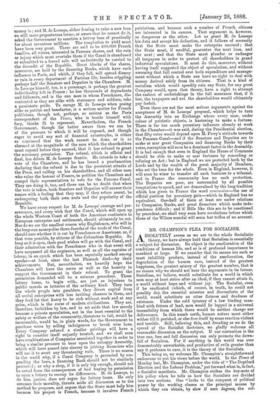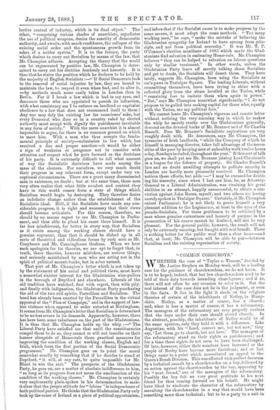MR. CHAMPION'S PLEA FOR SOCIALISM.
ABSOLUTELY averse as we are to the whole Socialistic theory, we have always held that Socialism is essentially a subject for discussion. Its object is the amelioration of the conditions of human life, and so is of profound importance to mankind at large. If we consider that its means are such as must infallibly produce, instead of the amelioration, the degradation of the human race, instead of the greatest happiness, the greatest misery of the greatest number, that is no reason why we should not hear the arguments in its favour. Socialism, we believe, would substitute for a world in which men may at least strive after an ideal, if they cannot attain it, a world without hope and without joy. The Socialist, even if he eradicated (which, of course, in truth, he could not possibly do), the essential miseries and discomforts of the world, would substitute an utter flatness and deadness of existence. Under the cold tyranny of a law binding man- kind with fetters of lead, men would lie lapped in a universal insensibility from which there would be neither change nor deliverance. In this numb earth, human nature must either wither till it perished, or else free itself by some reaction violent and terrible. Still, believing this, and dreading as we do the spread of the Socialist doctrines, we gladly welcome all reasonable discussion on the subject. If our contention is the true one, free and full discussion can only promote the down- fall of Socialism. For if anything in this world was ever demonstrably unworkable, and productive of evils greater than any it professes to cure, it is the theory of the Socialists. This being so, we welcome Mr. Champion's straightforward endeavour to put his views before the world. In the Times of Monday last, Mr. Champion, under the title of "The Deptford Election and the Labour Problem," put forward what is, in fact, a Socialist manifesto. Mr. Champion strikes the key-note of his policy when he tells us how the Socialists are divided into two sections. One "looks to the conquest of political power by the working classes as the principal means by which they can obtain, by slow if sure degrees, the col-
lective control of industry, which is its final object." The other, "comprising various shades of anarchists, repudiates the use of political weapons, denies the sanctity of democratic authority, and awaits, with much confidence, the collapse of the existing social order and the spontaneous growth from its ashes of a nobler system." It is to the former, the party which desires to carry out Socialism by means of the law, that Mr. Champion adheres. Accepting the theory that the world can be regenerated by positive law, Mr. Champion is deter- mined to carry out his doctrine fearlessly and honestly. It is thus that he states the position which he declares to be held by the majority of English Socialists :—" If Social Democrats look to the removal of social injustice by law, they are bound to maintain the law, to respect it even when bad, and to alter it, —by methods much more easily taken in London than in Berlin. For if I break a law which is bad in my eyes, and denounce those who are appointed to punish its infraction, with what consistency am I to enforce on landlord or capitalist obedience to a law that does not recommend itself to them ? Any one may defy the existing law for conscience' sake, but every Democrat who does so in a country ruled by elected authority must accept with dignity the punishment inevitable in any form of society." With the mere anarchist it is almost impossible to argue, for there is no common ground on which to meet him. With a man who thus accepts the funda- mental principle of society—submission to law which has received a due and proper sanction—it would be either a sign of weakness or arrogance not to consider with attention and respect what he puts forward as the doctrines of his party. It is extremely difficult to tell what amount of way the Socialistic doctrines have made among the mass of the electors. For ourselves, we very much doubt their progress in any coherent form, except under very ex- ceptional circumstances. There are a great many discontented men in existence, no doubt ; but at the same time, those men very often realise that what little comfort and content they have in this world comes from a state of things which Socialism would begin by destroying. They therefore desire an indefinite change rather than the establishment of the Socialistic ideal. Still, if the Socialists have made any con- siderable progress, it is right and necessary that their views should become articulate. For this reason, therefore, we should by no means regret to see Mr. Champion in Parlia- ment, and thus able to plead his cause there himself. It is far less mischievous, far better in every way, that Socialism as it exists among the working classes should have a genuine exponent, than that it should be dished up in all sorts of theatrical and ridiculous forms by such men as Mr. Conybeare and Mr. Cunninghame Graham. When we hear such apologists for its theories, we are apt to forget that, in truth, these theories, however mistaken, are serious things, and seriously maintained by men who are acting not in the spirit of political mountebanks, but in sober earnest.
That part of Mr. Champion's letter which is not taken up by the statement of his social and political views, must have a somewhat sinister interest for the Gladstonian wire-pullers in the borough of Deptford and elsewhere. Liberals of the old tradition have watched, first with regret, then with pity, and finally with indignation, the Gladstonian Party purchasing the aid of the two evil spirits, Parnellism and Socialism. The bond has already been exacted by the Parnellites in the virtual approval of the" Plan of Campaign," and in the support of law- less violence when opposed to order extorted at Nottingham. it seems from Mr. Champion's letter that Socialism is determined to be no less severe in its demands. Apparently, however, there has here been some reluctance on the part of the Gladstonians. It is thus that Mr. Champion holds up the whip :—" The Liberal Party have satisfied me that until the constituencies compel them to do so, they cannot or will not inscribe on their banner alongside of Home-rule those practical measures for improving the condition of the working classes, English and Irish, which form the first portion of the Social Democratic programme." Mr. Champion goes on to point the moral somewhat cruelly by remarking that if he decides to stand at Deptford, "it will, at any rate, be quite impossible for Mr. Blunt to win the seat." The prospects of the Gladstonian Party, he goes on, are a matter of absolute indifference to him, "so long as its progress does not mean the amelioration of the condition of the working classes." Mr. Champion is certainly very unpleasantly plain-spoken in his determination to make it clear that the proper attitude for" labour "is independence of both political parties. He thinks that the Gladstonian Party only took up the cause of Ireland as a piece of political opportunism,
and infers that if the Socialist cause is to make progress by the same means, it must adopt the same methods. "Too many working men," he says, "make the mistake of believing the Gladstonian sympathy for Ireland to have sprung from prin- ciple, and not from political necessity." It was Mr. T. P. O'Connor's election manifesto of 1885 which made the Glad- stonians find salvation in embracing Home-rule. Mr. Champion believes "they can be helped to salvation on labour questions only by similar treatment." In other words, unless the Gladstonian Party leave off merely talking sham Socialism and get to deeds, the Socialists will desert them. They have lately, suggests Mr. Champion, been using the Socialists as cat's-paws in Trafalgar Square. The leading Liberals, without committing themselves, have been trying to shine with a reflected glory from the abuse levelled at the Tories, while "remaining free to imitate them when again in power." "But" says Mr. Champion somewhat significantly, "I do not propose to be gulled into making capital for those who, equally with the Tories, are my political foes."
We cannot leave Mr. Champion's vigorous and caustic letter without noticing the very amusing way in which he makes the whip he merely cracks over the Gladstonians generally, descend on the devoted backs of Mr. Brunner and of Sir Charles Russell. Poor Mr. Brunner's Socialistic aspirations are very roughly dealt with. He denounces, says Mr. Champion, the tyrannies of Irish landlords, "while the Company of which he himself is managing director, takes full advantage of the neces- sities of the poor by keeping men at unhealthy work twelve hours a day, Sundays included, throughout the year." If this sort of talk goes on, we shall yet see Mr. Brunner joining Lord Clanricarda in a league for the defence of property. Sir Charles Russell's late and no doubt unwilling attempts to palliate anarchy in London are hardly more pleasantly received. Mr. Champion notices these efforts, but adds :—" I may be excused for doubt- ing his sincerity, since when I last saw him, he, as Attorney- General to a Liberal Administration, was straining his great abilities in an attempt, happily unsuccessful, to obtain a con- viction against John Burns, myself, and two others for having, merely spoken in Trafalgar Square." Certainly, if Mr. Champion enters Parliament, he is not likely to prove himself a very pleasant addition to the Legislature, at least in the eyes of the- pseudo-Socialists. For these gentlemen to be criticised by a man whose genuine earnestness and honesty of purpose in the prosecution of his course cannot be doubted, will not be very pleasant. For the general public, however, the result will not only be extremely amusing, but fraught with real benefit. There is nothing better for the public weal than a clear issue—and' that, at least, Mr. Champion will be able to put—between Socialism and the existing organisation of society.



















































 Previous page
Previous page